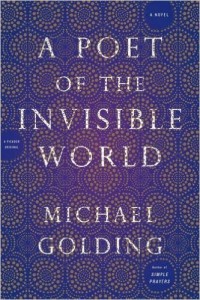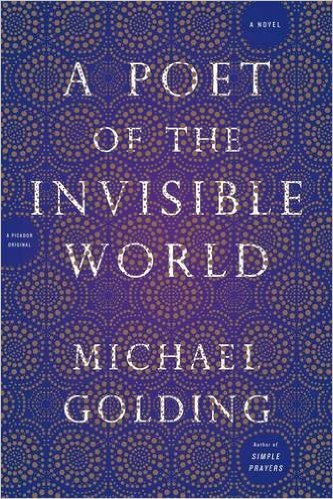 A Poet of the Invisible World
A Poet of the Invisible World
by Michael Golding
Picador. 323 pages, $16.
THIS INVENTIVE, thoughtful novel tells the story of one man’s spiritual journey, with a mixture of travel, romance, action, and literature. Beginning in Persia, a boy named Nouri is born with four ears, a fact that his mother takes great pains to conceal from the villagers. Despite her love and protection, the baby ends up in a Sufi order, literally falling from the sky into the hands of the caretaker Habbib, who raises him, first with his assistant Ali Majid’s help and later with the religious masters. It soon becomes clear that Nouri’s extra ears are a sign of gifts in the child, as he proves a remarkably talented poet. Throughout the novel, however, he is torn between poetry and religion, wishing to become a mystic like the head of the order.
Nouri’s life seems reasonably well-ordered until tragedy strikes and he finds himself separated from his adopted family, in a foreign land serving a sultan. His new master is a poetry lover, however, and puts Nouri’s gifts to good use. Eventually, though, the situation becomes dangerous,
He has one more dramatic change in circumstances before finding himself, quite by accident, in another Sufi order. In this familiar place he finds peace, purpose, and even love with a young novice named Ryka. Born with his heart reversed, this young man is sickly and scholarly, yet finds a calling for Sufi life. His passion quickly extends to Nouri, and the two outcasts form a loving, sensual relationship.
Sadly, not all in the order accept their bond, and one mystic from Nouri’s past, a man wrestling with his own demons, works to sabotage it. Ryka suffers dearly from this cruel treatment, and Nouri finds himself on the road again, trying to understand what happened. Eventually, his journey finds him back at the beginning, where he discovers spiritual and personal truths.
Golding’s novel is best read as a fable depicting Nouri’s life as a series of challenges that he must overcome to gain deeper understanding. The tone at the beginning is rather lighthearted, with Nouri’s situation shown almost humorously, especially his first meeting with Habbib. Although the book becomes darker with the terrible things Nouri must go through, the style is fluid and unencumbered. The spirituality arises naturally from the story, and you don’t need to know anything about Sufism to enjoy it.
Many readers will certainly identify with Nouri’s search for his place in the world and meaning in his life, as well as his struggle to reconcile his love of the physical world, as embodied in his poetry, with his desire for spiritual enlightenment. Entertaining and profound at the same time, at times amusing and tragic, the novel is a new telling of an often told tale.
Readers familiar with the 13th-century Persian poet Rumi may find parallels between his life and Nouri’s. Rumi met a wandering Sufi named Shams, who inspired the pious scholar to become a mystical poet, and his verse is still popular today. Their relationship seemed to frighten Rumi’s contemporaries, who attempted to break them up several times. While A Poet of the Invisible World is not a nonfiction biography of Rumi, and anyone expecting that will be disappointed, it seems a safe bet that Michael Golding drew on the poet’s life as inspiration for this novel.
________________________________________________________
Charles Green is a writer based in Annapolis, Maryland.






